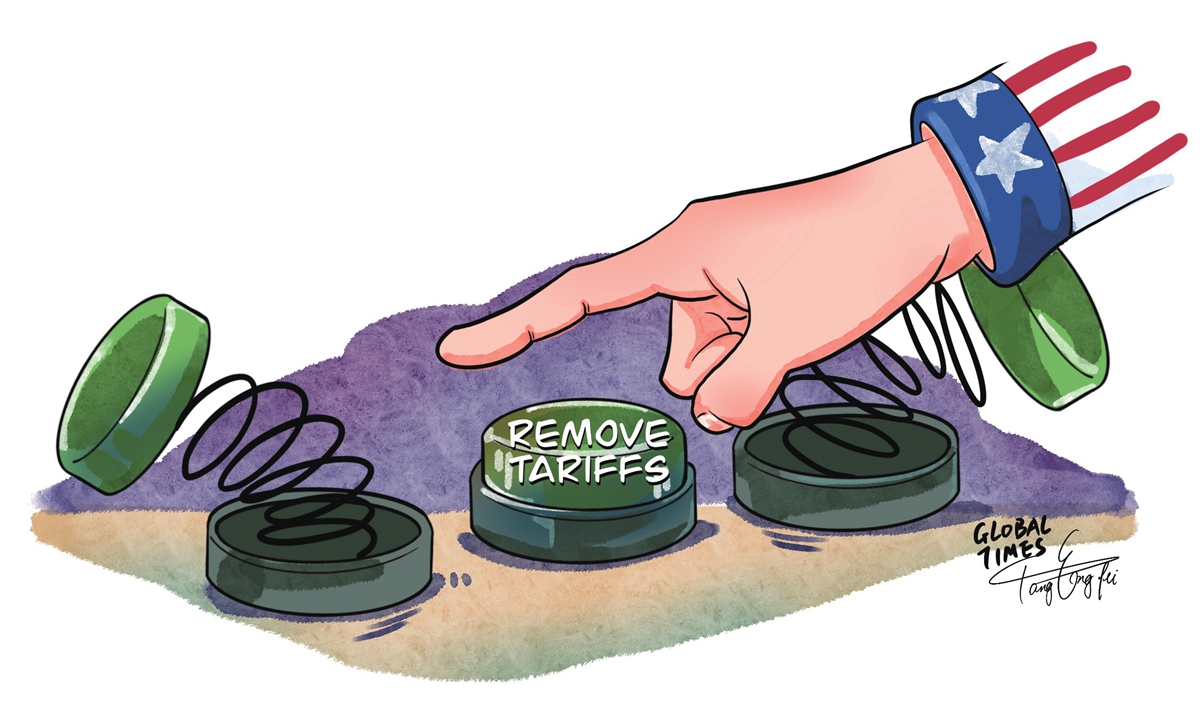COMMENTS / COLUMNISTS
Facing a domestic mess, Biden’s viable option is to remove tariffs

Facing a domestic mess, Biden's viable option is to remove tariffs. Illustration: Tang Tengfei/GT
After a week of diplomacy in Europe, where he had to apologize to world leaders for his predecessor's decision to withdraw from the Paris climate pact, US President Joe Biden returned to Washington on Wednesday to face what some call a political nightmare that is placing his presidency as well as his Democratic Party's electoral prospects in upcoming key races under serious question.
In the closely watched gubernatorial election in the state of Virginia, Biden-backed Democratic candidate Terry McAuliffe lost the race to Republican Glenn Youngkin.
Biden, who won the state in last year's US presidential election by 10 points, had thrown his full support behind McAuliffe and even predicted just hours before the race was called that his candidate would win. As numerous US media reports and political pundits pointed out, the result was a resounding rejection of Biden's performance this year.
Indeed, there is no "notable performance" to speak of in Biden's presidency so far. He has failed to rein in the COVID-19 pandemic in the country, as he pledged to do. On Wednesday, the US hit another grim milestone as the death toll from COVID-19 topping 750,000. His multi-trillion dollar legislative agenda that covers everything from infrastructure, social welfare to climate change initiatives is stuck in the US Congress, weighed down by disagreements within his own party.
On the economic front, not only did the US economy fail to realize the vibrant recovery Biden and his top officials had touted for months, it now faces mounting inflationary pressure with growth pace of one key inflation barometer hitting a three-decade high in September. Unchecked price rises are already exerting rising burden on US households, as they face higher costs for food, rent and other daily necessities. That also forced the hands of US monetary policymakers to pull back economic stimulus to counter inflation risks.
On Wednesday, the US Fed announced that it would begin to reduce its $120 billion in monthly bond purchases by $15 billion per month. The program was launched to spur borrowing and spending, while keeping interest rates low. But the move on Wednesday, coming even as the US economy only grew 2 percent on an annualized basis in the third quarter, means the US has simply been left with no better options.
But there is still an option that could have immediate positive effect on the US economy, particularly its skyrocketing inflation. In an interview with the Reuters this week, US Treasury Secretary Janet Yellen said that the US could consider lowering some tariffs on Chinese products. Yellen said that tariffs tend to boost prices and costs for US consumers and businesses and that lowering tariffs could have a "disinflationary" effect.
In an apparent attempt to put pressure on China and use the possibility of abolishing or lowering tariffs as leverage in trade talks, Yellen said that the US was expecting China to meet commitments under the phase one trade agreement and reducing tariffs would be reciprocal.
It's clear that though Yellen and other US economic officials are well aware of the need to remove tariffs on Chinese products to help address the US' domestic economic woes, the Biden administration, politically, wants to appear to be tough on China.
But the question is -- can the Biden administration maintain such an approach - dealing with China from "a position of strength," as US officials put it - when they clearly lack the strength, particularly when it comes to economic performance.
Talking tough on China may be politically correct in US politics, but it's wrong when the US economy, consumers and businesses are hurting. Even from a political standpoint, with major election losses across the board on Wednesday in Virginia and mid-term elections are coming up next year, Biden needs to be pragmatic in addressing the concerns of voters, rather than focusing on playing geopolitical games.
Simply put, given the current domestic mess faced by Biden, his administration has no leverage or strength to use the tariffs to coerce China into making concessions. The White House has no other viable option that could deliver immediate results than removing the tariffs imposed by Trump. And this is where he probably needs to apologize to US consumers and businesses.
The author is a senior editor at the Global Times. bizopinion@globaltimes.com.cn

